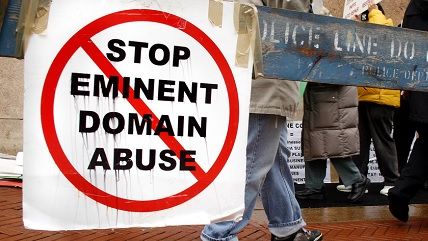Theft-by-Government Continues Through Eminent Domain
Governments ignoring the constitutional limitations to eminent domain.

Three years ago Virginia residents passed a constitutional amendment to limit legalized theft through eminent-domain abuse. The amendment required that property be taken only for a genuinely public purpose. No longer could governments take one person's land and give it to somebody else for economic development. Opponents of the measure issued dark warnings about the terrible consequences that would ensue, but those predictions failed to come true.
Problem solved, right? Not on your life.
Just ask Richard Dwyer. The town of Culpeper, Virginia has taken a big chunk of his land—and wants to make him sell it for a song.
For many years Dwyer bought up small parcels as a way to prepare for his retirement. Eventually he put together 26 acres, part of which was floodplain and part of which had been zoned for high-density residential development. The zoning would entitle him to build up to 344 units.
"In 2006, I had a written offer of $16.1 million for that land," Dwyer told the Fredericksburg Free Lance-Star, which recounted his story in detail a few days ago. Then Culpeper decided to build a big road, commonly called the inner loop. It confiscated more than five acres of his best property to do it. "They took the buildable land and left me with the floodplain," Dwyer told the newspaper. Now he's looking at 152 potential units instead of 344.
Two years ago, Culpeper—based on its own appraisal—decided the land it had taken was worth a little more than $466,000. Dwyer's appraiser put the value slightly higher: $3.4 million.
The two parties couldn't reach an agreement. So Culpeper brought in another appraiser who decided the seized land was worth a measly $130,000.
If that sounds familiar, it should. A lowball second appraisal is a common negotiating tactic in eminent-domain disputes. It's called sandbagging. The Virginia Department of Transportation (VDOT) tried to pull the stunt on a Virginia Beach couple a few years ago.
When John and Janet Ramsey didn't accept VDOT's original offer of nearly a quarter-million dollars, VDOT came back with a second appraisal of only $92,000. The couple fought back in court—where VDOT tried to have its initial, higher appraisal squashed so the jury couldn't learn of it. The Virginia Supreme Court ruled unanimously against that malicious ploy.
There are even more outlandish examples. In one case, the government's appraisal dropped from $214,000 to just $14,000. Joe Waldo, who specializes in defending property owners from unjust confiscations, says the sandbagging scheme is a way to make property owners knuckle under: If you don't like the government's first offer, maybe you'd like a nice swift kick in the teeth, hunh?
Culpeper officials—like their counterparts at VDOT—say they're just trying to look out for the public. Culpeper Town Manager Chris Hively told the Free Lance-Star that the town "has a duty to be the guardian of the taxpayers' hard-earned tax dollars… The town cannot squander taxpayers' money by paying an amount that grossly exceeds our experts' appraisal."
But it can squander taxpayers' money on attorneys' fees, apparently. The newspaper reports that Culpeper has already spent $425,000 litigating Dwyer's case. It's going to spend a lot more before the case is over.
That, too, is not so unusual. In the Ramseys' case, VDOT spent as much on lawyers' fees trying to get the property at a lower price as it would have spent paying its initial offer. In another case, the state offered $7,000 for a parcel of land next to German School Road in Richmond. The owner asked for $30,000. Rather than accede, the agency fought. A jury awarded the owner nearly twice what she asked: $52,000. And the agency spent another $61,000 in lawyers' fees.
The Fifth Amendment to the Constitution lets the government take private property. But it imposes two conditions. The condemnation must be "for public use," and a road certainly qualifies as a public use. But the property also cannot be taken "without just compensation." The Supreme Court's infamous ruling in Kelo v. New London drew a red pencil through the first requirement. Since then most states have at least tried to restore the stipulation.
But as Dwyer's case and others like it show, state and local governments frequently flout the second stipulation—often with impunity. The General Assembly should put a stop to that. And with lawmakers currently in session, what better time than the present?
This column originally appeared at the Richmond Times-Dispatch.


Show Comments (8)